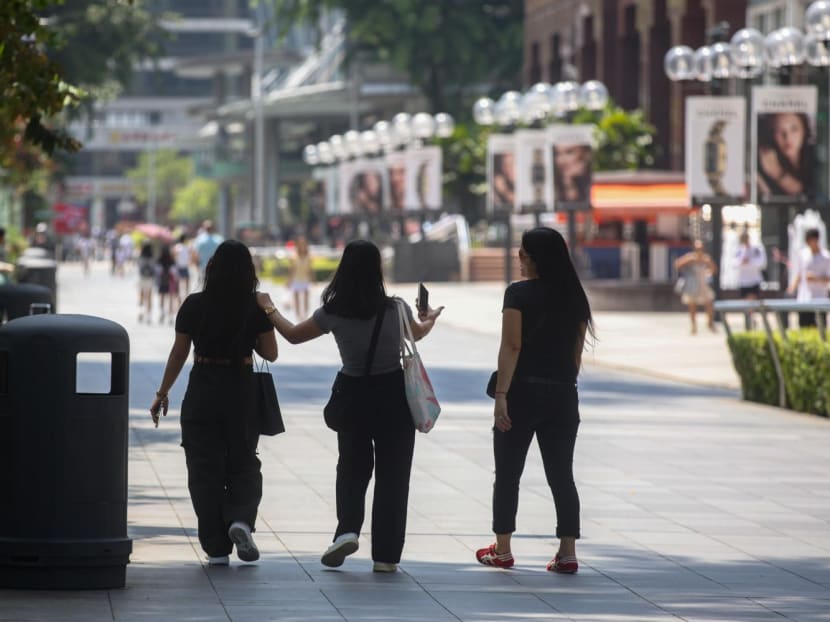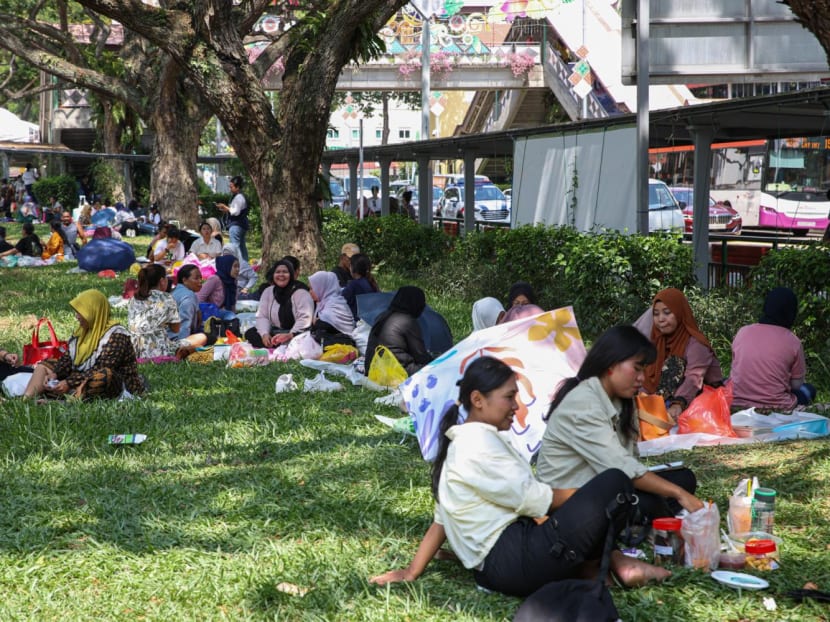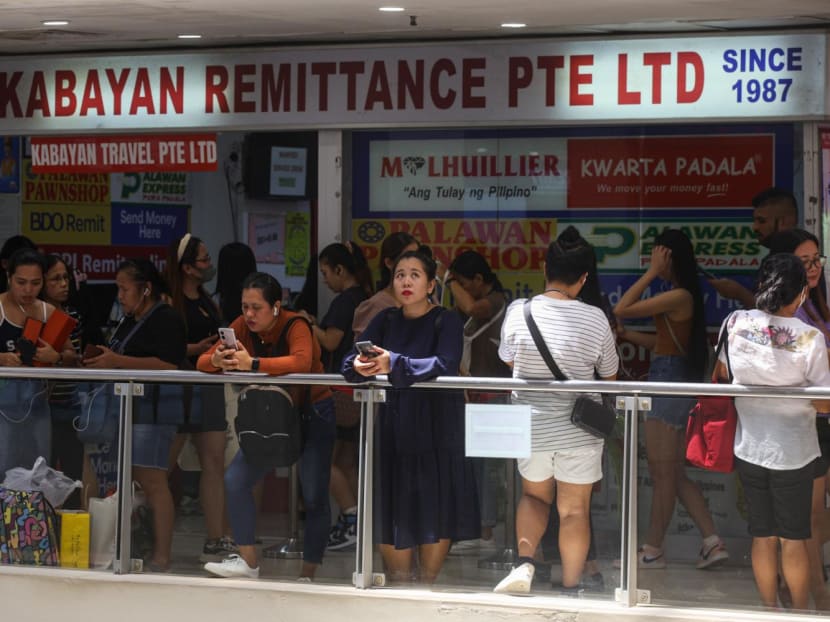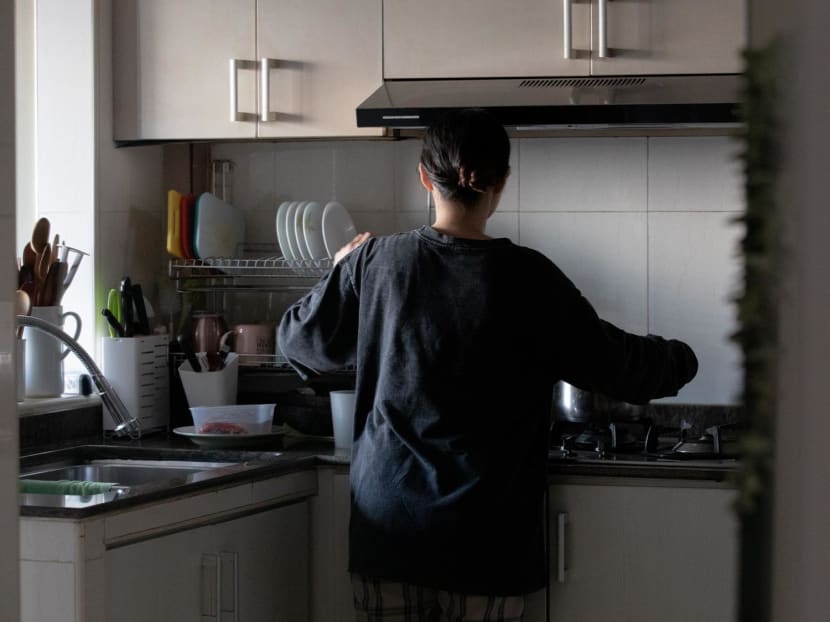- Joined
- Apr 14, 2011
- Messages
- 20,454
- Points
- 113
The Big Read: Burdened with family expectations and lured by temptations, some foreign domestic workers get snared in debt trap

Some foreign domestic workers borrow from both legal and illegal moneylenders, with maid agencies and nonprofit organisations saying they have seen a rise in debt cases.
https://tdy.sg/47JGhKL
- Foreign domestic workers (FDWs) in Singapore have lately taken to pawning gold jewellery bought on instalment plans with zero upfront payment
- This helps them obtain much-needed cash, but high interest rates charged by jewellery shops often mean workers cannot repay monies owed and end up in debt
- Some FDWs also borrow from both legal and illegal moneylenders, with maid agencies and charities saying they have seen a rise in cases of maids taking loans and getting into debts
- FDWs interviewed by TODAY said that familial pressures on them to send a big portion of their salaries home, coupled with the occasional family emergency, often force them to borrow money
- FDWs, employers, maid agencies, charities and MPs whom TODAY spoke to offered various suggestions on how to better address the longstanding problem

BY
RENALD LOH
Published March 29, 2024Updated March 29, 2024
WhatsAppTelegramFacebookTwitterEmailLinkedIn
SINGAPORE — Two freak accidents involving her brother and nephew on an island north of Manila late last year turned a Filipino domestic helper’s life upside down. The 45-year-old, who has worked in Singapore since 1999, had to find a way to raise around 85,000 pesos (S$2,000) to pay for their surgery and hospitalisation bills.
Having previously borrowed S$5,000 from her employer which she later returned, Ms Melissa (not her real name) did not want to make yet another hefty loan request.
So she borrowed various sums of money from four different friends and a licensed moneylender from the Philippines, all of whom charged her an interest for their loans.
For months, sleep was hard to come by, she said. “I just keep thinking (about) how to pay back all these people.”
She briefly considered turning to local moneylenders to do so, but was intimidated by horror stories from myriad peers who said they would do “bad things” to foreign domestic workers (FDWs) who did not repay their debts on time.
Ms Melissa thus decided to roll the dice, quite literally, by turning to online gambling sites. But Lady Luck was disinterested in her prayers, and her financial woes worsened, all the while without her employer knowing.
She lost more than S$5,000 over four months.
“I don’t want to gamble anymore. It was very difficult, very stressful,” she said. She spoke to TODAY on condition of anonymity for fear of getting into trouble with her employer.
Help eventually came in the form of her aunt, also a FDW in Singapore, who lent her S$3,000 to pay off all monies owed.
With all her debt now consolidated to just her aunt, she said she feels significantly more at ease, and is focused on repaying her debt in the coming months.
Ms Monette, 41, another FDW who did not want to give her last name for fear of reprisal from her current employer, went through a similar situation in 2018.
She borrowed S$500 from a licensed moneylender in Singapore to pay for her mother’s hospital bills back in Manila and struggled to repay her debt. So she borrowed from another moneylender, and then another.
Ms Monette ended up owing money to six different moneylenders, including one loan shark.
Both Ms Monette and Ms Melissa told TODAY that they know of many fellow maids who are in similar situations — facing piling debts that could spell the end of their working stint in Singapore.
This is because FDWs are prohibited from borrowing from unlicensed moneylenders, and will be liable to have their work permits revoked and barred from future employment in the country if they do so, according to the Ministry of Manpower (MOM).

Employers upset with their domestic helpers for getting into debt, or those harassed by moneylenders and fear for their safety, also tend to repatriate them.
Unfortunately, this precarious financial situation that many FDWs find themselves in is not new.
READ ALSO
Foreign domestic workers lament cuts in loan limits, as NGOs stress need for better financial literacy
In 2019, a study commissioned by information services company Experian and Hong Kong charity Enrich found that a third of FDWs in Singapore were in debt.
That same year, the Government revealed that there had been a sharp rise in foreigners borrowing from licensed moneylenders from 2016 to 2018.
In 2016, 7,500 foreigners borrowed from licensed moneylenders. The figure jumped more than seven-fold to 55,000 in 2018, with a further 53,000 borrowing from licensed moneylenders in the first half of 2019 alone.
To curb the spike, the Ministry of Law introduced a slew of measures in 2019, including a loan cap for low-income foreigners — limiting the combined amount they can borrow across all moneylenders to just S$500.
These measures appear to have worked.
The number of FDWs borrowing from licensed moneylenders had “increased but remains low at about 150 borrowers per year” from 2020 to 2022, MOM said in response to a parliamentary question by Member of Parliament (MP) Seah Kian Peng in February 2023.
The ministry also noted, however, that the number of FDWs borrowing from unlicensed moneylenders was estimated by the Singapore Police Force to be “in the hundreds”, and that the figure had been increasing from 2020 to 2022.
The measures meant to restrict FDWs from borrowing from licensed moneylenders might have inadvertently led these migrant workers to find other ways of obtaining money they desperately need, some welfare organisations told TODAY.
Indeed, such ways include purchasing gold jewellery via instalments without any upfront payment at some stores in malls such as Lucky Plaza, then pawning them immediately for a sum of cash, as reported recently by TODAY.
Ms Cyndelene Miranda, a 48-year-old Filipino who has been a domestic worker in Singapore for 13 years, said that around a third of her friends have struggled to pay back what they owe these jewellery shops in instalments, due to the high interest rates charged.
For instance, one store charges about S$100 in interest for every gram of gold — so a worker would have to pay S$300 for an item containing 3g of gold on top of its selling price.

Ms Miranda added that she and her peers also often receive messages via WhatsApp from unknown numbers offering to loan them money; with some maids taking up those offers in desperation.
With over 280,000 FDWs in Singapore today, concerns abound whether society is doing enough to help this vulnerable group of workers.
TODAY looks at the factors that lead these FDWs into debt, why this concerns society at large and what can be done to solve this persistent problem.
RISE IN BORROWING FROM UNLICENSED MONEYLENDERS
While there have not been any updated statistics on how many FDWs are in debt since 2019, several charities and maid employment agencies told TODAY that they have seen a rise in complaints from employers about their maids borrowing from unlicensed moneylenders, including loan sharks.One such charity, Blessed Grace Social Services, said that the debt situation “has not improved” in recent years. FDWs seek help from the charity for their financial troubles every week, and there are around 50 who are currently in debt, it said.
Mr Edmund Pooh, general manager of Universal Employment Agency, said it has also noticed an uptick in FDWs either borrowing or acting as guarantors for money borrowed legally and illegally.
The agency would normally receive one or two complaints from employers in a year, Mr Pooh said, but that had gone up to five or six in 2023.
This increase in borrowing was corroborated by spokespeople from the Humanitarian Organization for Migration Economics (Home) and the Association of Employment Agencies (AEAS) as well.
However, the Foreign Domestic Worker Association for Social Support and Training (Fast), a charity supported by MOM, said it had not seen a significant change in the number of cases it dealt with regarding debt.
Blessed Grace added that it has seen a rise in cases of FDWs owing money to retail shops — including stores selling jewellery in Lucky Plaza — which charge “unreasonably exorbitant” interest rates on their products too.
“The late interest charges sometimes even end up becoming greater than the principal sum, so it becomes an endless cycle of repayment since the late interest charges continue to run. This is also known as a debt trap,” the charity said.

Sitting alongside the struggles that domestic helpers face when they end up in debt is the tricky predicament that employers find themselves in as well.
Mr Joseph Ong, whose helper of 10 years was saddled with around S$1,000 in debt this year, said that she was often “distracted and looking troubled” because of it. Mr Ong, who is in his 40s, ended up paying her outstanding payments.
For hairdresser Rachelle Foo and her family, their former domestic helper of 14 years would often ask Ms Foo’s parents for four to six months’ worth of salary in advance, and borrow sums of money from her and her siblings too.
Ms Foo said that the maid would spend her days crying at home when she was short of money, which the latter said was because of family emergencies back home in Indonesia.
“We hired her mainly to look after our grandma, who is 106 years old, just in case anything happens when we are out at work,” she said.
“Our main concern was whether she could focus on her work, and whether her money problems would be recurring … There’s only so much we can help (financially).”
Regrettably, despite the family consistently providing loans when she needed them, their helper eventually resorted to stealing their jewellery and cash in 2023 — which Ms Foo called a “traumatic” experience as they had regarded her as part of the household.
Their former helper was sentenced to 14 months’ jail last Thursday (March 21).
Employers may also end up being harassed or even threatened by loan sharks for repayment of their maids’ debts, which can leave them feeling unsafe and vulnerable.
In such cases, they typically have to bear the costs to send their domestic helper home and hire a replacement.
WHY PROBLEM PERSISTS
In addition to limiting the amount that low-income foreigners (who earn less than S$10,000 a year) can borrow to S$500, the Ministry of Law implemented other measures in 2019 to prohibit licensed moneylenders from targeting these workers in their advertisements.Starting Aug 16 of that year, they are not allowed to lend to more than 300 foreigners and up to S$150,000 in total loans to foreigners at any one time.
To complement these enforcements, the MOM said in 2023 that it has been working closely with various stakeholders to educate migrant workers, including FDWs, on “prudent financial management practices and the risks and implications of borrowing money”.
This is done through the mandatory Settling-In-Programme for all first-time FDWs, guidebooks like the Money Management Guide for Migrant Domestic Workers, regular newsletters, and by educating employers to advise their FDWs to stay away from unlicensed moneylenders.

The ministry also has a dedicated TikTok account for FDWs, “Friends_SgMDW”, which posts videos in domestic helpers’ native languages to warn them about scams and offer avenues where they can reach out for help if they face financial troubles.
Several of their videos have even racked up over two million views.
Additionally, around 300 member agencies of the AEAS — which the association says handles about 70 per cent of all FDWs placed in Singapore — remind workers not to borrow money through illegal means as part of their “orientation checklist”.
So why do agencies and charities still see an increasing number of domestic workers in deep financial water?
As licensed moneylenders have existing quotas on how many foreigners they can loan to, they tend not to be willing to lend to low-income FDWs, said Blessed Grace.
“Hence, with no legal avenues for the FDWs to borrow from, they resort to borrowing from unlicensed moneylenders, retail companies/shops, and handphone or jewellery shops.”
Social media applications like Facebook and TikTok also provide an easy avenue for exploitative businesses and illegal moneylenders to reach FDWs, and this has exacerbated the problem, said Mr Jeffrey Wong, founder of JForce Employment Agency.
Another key factor is the influence of fellow FDWs.
AEAS president K Jayaprema said that “peer relationships” between FDWs are often more persuasive than the words of caution given by organisations.
“When a friend tells another friend: ‘Don't worry, this is okay, I've done this’ — you will just listen," she said.
“The advice from MOM, the association, or the agency which deploys them at the beginning — how would this stay in somebody's mind, who is at that point, in a desperate need of money?”
Mr Wong from JForce agreed, saying: “No matter how much we teach them, I can’t fight with their friends because they are with them (so often) — on Facebook Messenger, TikTok, forums… (They think) since everyone is doing that, why not me?”
PRESSURES OF PROVIDING FOR FAMILY
Another key reason why FDWs sink into debt is the outsized responsibility some of them bear in caring for extended family back home, some of whom see these workers as an easy source of financial help given the perception that they are earning good money in Singapore.FDWs typically earn anything from S$500 to just over S$1,000 a month depending on their nationality and experience, according to agencies that TODAY spoke to.
For domestic helpers who come from Myanmar, the country’s political instability amid the Covid-19 pandemic in recent years is another factor why they feel a financial strain.

Ms Yoon Wai Wai Khin, a 31-year-old domestic helper, used to earn a monthly salary of S$500 in 2021 and would send nearly all of her earnings back home to Bago each month, occasionally leaving her with just S$10 in the bank.
Her father, the other breadwinner in her family who drives for a living, was unable to work due to the Myanmar government’s restrictions, and Ms Yoon was forced to borrow money from her employer to help her family of five survive.
The picture painted by Ms Yoon of the familial pressure to give almost everything they have to their loved ones is a familiar one to FDWs, regardless of their nationality.
“The main reason (for being in debt) is our family needs in the Philippines,” said a 33-year-old domestic helper from Nueva Ecija, who wanted to be known only as Ms Jane.
She had borrowed from a total of five different moneylenders and a loan shark to pay for her son’s hospital bills in 2018 after her employer rejected her request for a salary advance.
Not being able to repay her debts, she was repeatedly harassed by moneylenders through text messages which contained many “nasty words”.
But Ms Jane felt that she did not have any other choice back then.
“We want to support them even though we don’t have anything here. We try our best to give them what we have, without even realising that we are the ones who fall into trouble,” she said.
Both Ms Jane and Ms Monette managed to find support with Blessed Grace Social Services, which enrolled them in a “debt consolidation programme” where a third-party company helped to pay off their existing loans.
FDWs under this programme would then be able to repay monies owed to just one party, as opposed to many, on a more manageable schedule.
Reflecting on what they went through over five years ago, both women said that they have learned to turn down their family’s requests when they do not have the means to help, even if it is tough to do so.
“We have very strong family ties. Even my nephews, I have to (pay to) send them to school. I have to help my sister’s family, my brother’s family. That’s our culture. Even if they don’t ask for money, we will give,” said Ms Monette.
She added: “Now if I don’t have money, I say no… I’m very thankful that I don’t have debt (now), and I have money for emergencies, something to take out from my bank.
“As much as possible, we want our fellow domestic helpers to learn financial literacy… and that it’s okay to say no if we don’t have (money) — we cannot give everything.”
NOT BY FINANCIAL LITERACY ALONE
Such anecdotes from FDWs, which almost always outline familial pressures to send large portions of their salary home, are indicative of just how financially vulnerable these domestic helpers are.The occasional family emergency further adds to their susceptibility of getting into debt or being preyed upon by businesses.
It is important to address the root cause of why FDWs are getting into debts, said Assistant Professor of Sociology Shannon Ang from Nanyang Technological University, as Singapore has an obligation to care for the well-being of migrant workers who contribute substantially to society.

On what more can be done to tackle the issue of maids getting into debts, FDWs, employers, maid agencies, charities and MPs whom TODAY spoke to offered various suggestions.
ADVERTISEMENT
MP for Yio Chu Kang Single Member Constituency Yip Hon Weng said that the Government "should do more" during the interviews that the Centre for Domestic Employees conducts for new workers, as it is an avenue for FDWs to open up about their monetary concerns privately without their employers present, and to provide them with some form of financial counselling.
Mr Yip had posed a parliamentary question in May 2021 to then Manpower Minister Josephine Teo on how to ensure FDWs would be able "to honestly share their concerns", to which Ms Teo responded in writing that the centre would "endeavour to create a safe environment" and that it aimed to conduct all interviews in FDWs' native languages to ensure they are understood.
Such a safe environment should extend to the home as well, said migrant workers' rights group Transient Workers Count Too.
Preventing FDWs from getting into debts "starts at home through a culture of open communication and understanding, so that our helpers feel comfortable sharing their problems, which we may potentially be able to help with before they resort to risky solutions," it said.
Agreeing, Asst Prof Ang believes that society needs to find ways to enable FDWs to speak up “more freely” about their conditions, needs, difficulties and aspirations — “all without the fear of facing reprisal”.
For Ms Monette, Ms Melissa, Ms Yoon and many FDWs, inculcating a culture of responsible spending through financial literacy could be key to preventing FDWs from falling into a vicious cycle of debts.
ADVERTISEMENT
But educating FDWs in Singapore is just one piece of the puzzle.
“Education will help in the long run, but it does not resolve their immediate need to put food on the table back home,” said Mr Ong, the employer, who works in finance.
“I think providing an avenue for FDWs to access short-term, micro loans through government programmes and non-profit organisations will help. Right now, the only options available to FDWs are exploitative and prey on their desperation.”
Agreeing, the charity Blessed Grace believes having legal avenues for money lending will prevent FDWs from falling victim to abuse and exploitation.
Ms Foo, the other employer, suggested that it should be mandatory for employers’ consent to be sought if a FDW wishes to make certain high value financial transactions like obtaining loans from licensed moneylenders, pawning jewellery, or buying items on instalment plans.
“Now, they can do so as long as they have their work permit. But these (transactions are mostly) behind the employer’s back,” she said, adding that employers would have to bear the consequences should things go south.
In addition to recruitment agencies' existing efforts to remind FDWs not to borrow, regular workshops on managing debt and unlicensed moneylending could also be conducted for domestic helpers as these agencies are often the workers' first point of contact, said the MOM-supported charity Fast.
It also encourages employers to regularly check in with FDWs on their financial situation, educate them about the dangers of unlicensed moneylending and refer them to organisations like Fast should they require advice on debt management.
